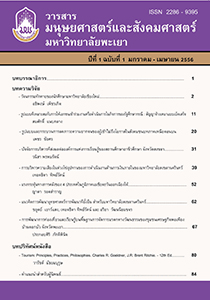การพัฒนาการท่องเที่ยวและเรียนรู้บนพื้นฐานการจัดการมรดกทางวัฒนธรรมของชุมชนเศรษฐกิจพอเพียงบ้านดอกบัว จังหวัดพะเยา
Keywords:
การท่องเที่ยว, การเรียนรู้, การจัดการมรดกทางวัฒนธรรม, ชุมชนเศรษฐกิจพอเพียง, Tourism, Learning, Cultural Heritage Management, Sufficiency CommunityAbstract
การศึกษาครั้งนี้มีวัตถุประสงค์เพื่อ 1) ศึกษาระดับการมีส่วนร่วมของคนในชุมชนที่มีต่อการพัฒนาการท่องเที่ยวและเรียนรู้บนพื้นฐานการจัดการมรดกทางวัฒนธรรม 2) ศึกษาทัศนคติของคนในชุมชนที่มีต่อการพัฒนาการท่องเที่ยวและเรียนรู้บนพื้นฐานการจัดการมรดกทางวัฒนธรรม และ 3) เสนอแนวทางการพัฒนาการท่องเที่ยวและเรียนรู้บนพื้นฐานการจัดการมรดกทางวัฒนธรรม
วิธีดำเนินการศึกษาครั้งนี้ใช้เทคนิควิจัยเชิงปริมาณและคุณภาพประกอบกัน โดยใช้เครื่องมือ คือ แบบสอบถาม แบบสัมภาษณ์ และการประชุมกลุ่มย่อย สำหรับกลุ่มตัวอย่างที่ใช้ในการศึกษา ได้แก่ หัวหน้าครัวเรือน จำนวน 142 คน กลุ่มผู้นำชุมชน คณะกรรมการหมู่บ้าน และตัวแทนกลุ่มอาชีพ จำนวน 28 คน ผลการศึกษาพบว่า 1) กลุ่มตัวอย่างมีส่วนร่วมในการพัฒนาการท่องเที่ยวโดยเฉลี่ยอยู่ระดับบ่อยครั้ง (= 1.74) การบริหารงานในชุมชนใช้กระบวนการกระจายอำนาจไปกลุ่มต่าง ๆ เช่น คุ้ม กลุ่มอาชีพ กลุ่มโฮมสเตย์ ใช้การตัดสินใจจากมติที่ได้จากการประชาคม โดยเน้นการสร้างความเข้าใจก่อนการประชาคม 2) ด้านทัศนคติที่มีต่อการพัฒนาการท่องเที่ยวและเรียนรู้ฯ อยู่ในเชิงบวก ประเด็นที่อยู่ในระดับเกณฑ์มากที่สุด คือ รู้สึกภาคภูมิใจในชุมชนของตนเองที่ได้เป็นแหล่งท่องเที่ยวและศึกษาดูงานที่สำคัญของจังหวัดพะเยา ซึ่งแสดงให้เห็นถึงความสำเร็จจากการบริหารจัดการชุมชนตามแนวคิดเศรษฐกิจพอเพียงที่มีพื้นฐานจากการสร้างคุณค่าและมูลค่าจากการสืบทอดวัฒนธรรม ภูมิปัญญา วิถีชีวิต และ 3) ด้านแนวทางการพัฒนาการท่องเที่ยวและเรียนรู้ฯ พบว่า กิจกรรมทางการท่องเที่ยวและเรียนรู้ที่สอดคล้องกับวัฒนธรรม ประเพณีและวิถีชวิตของคนในชุมชน และสร้างประสบการณ์และการเรียนรู้ให้กับนักท่องเที่ยว โดยอยู่บนพื้นฐานของการมีส่วนร่วมของชุมชน ซึ่งกิจกรรมที่กลุ่มตัวอย่างต้องการอยู่ในระดับเกณฑ์มากที่สุด คือ การเยี่ยมชมและสักการะบูชาวัดบ้านดอกบัว การรับประทานอาหารพื้นบ้าน/อาหารปลอดสารพิษของชุมชน การเรียนรู้งานหัตถกรรมจักสาน และการเรียนรู้วิถีเกษตรกับชุมชน
Tourism Development and Learning Based on Cultural Heritage Management at Dok Bua Sufficiency Community, Phayao Province
Prakobsiri Pakdeepinit
Tourism Program, School of Management and Information Sciences, University of Phayao
The objectives of this investigation were to examine participation levels and attitude of the community members toward the learning and tourism development and to propose a guideline for the development. These qualitative and quantitative studies were conducted by questionnaires, interviews and focus group meeting to collect the data and available information. The sample group included 142 household leaders and 28 community leaders, village council’s members and representatives of career groups. The findings revealed that
1) The sample group participated in tourism development were at a high level. The community management employed decentralization process to various groups based on resolutions from community public hearings with a focus on clear understanding before conducting the public hearings.
2) The community attitude toward the development and learning was positive. The issue with the highest level was community pride in being an important tourist attraction and a learning center in the province. This was indicative of the success of community management according to the sufficiency economy, based on the value and worth of their culture, wisdom and lifestyle.
3) Regarding the development guideline, it was found that learning and tourism activities got along in line very well with the community culture, traditions and ways of life with visitors’ learning and experiences based on community participation. The activities that the sample groups needed at the highest level were visiting and paying homage to Ban Dok Bua Temple, enjoying eating local or chemical-free foods, learning basketry handicraft, and learning the local agricultural ways of life.
Downloads
How to Cite
Issue
Section
License
ผู้นิพนธ์ต้องรับผิดชอบข้อความในบทนิพนธ์ของตน มหาวิทยาลัยพะเยาไม่จำเป็นต้องเห็นด้วยกับบทความที่ตีพิมพ์เสมอไป ผู้สนใจสามารถคัดลอก และนำไปใช้ได้ แต่จะต้องขออนุมัติเจ้าของ และได้รับการอนุมัติเป็นลายลักษณ์อักษรก่อน พร้อมกับมีการอ้างอิงและกล่าวคำขอบคุณให้ถูกต้องด้วย
The authors are themselves responsible for their contents. Signed articles may not always reflect the opinion of University of Phayao. The articles can be reproduced and reprinted, provided that permission is given by the authors and acknowledgement must be given.








